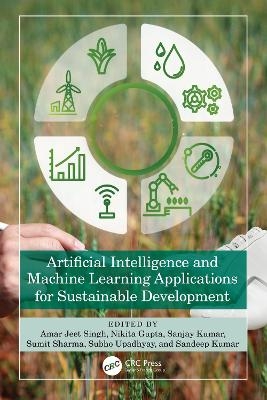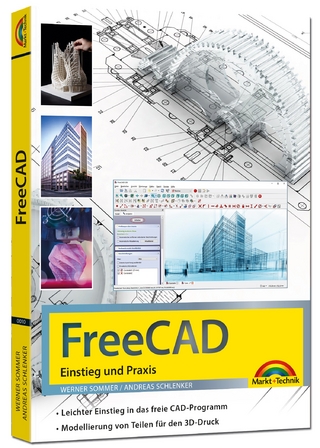
Artificial Intelligence and Machine Learning Applications for Sustainable Development
CRC Press (Verlag)
978-1-032-74214-4 (ISBN)
- Noch nicht erschienen (ca. Januar 2025)
- Versandkostenfrei innerhalb Deutschlands
- Auch auf Rechnung
- Verfügbarkeit in der Filiale vor Ort prüfen
- Artikel merken
This book:
Discusses artificial intelligence-based techniques, namely, neural networks, fuzzy expert systems, optimization techniques, and operational research.
Showcases the importance of artificial intelligence and machine learning in the energy market, demand analysis, and forecasting of renewable energy applications.
Illustrates strategies for sustainable development using artificial intelligence and machine learning applications.
Presents applications of artificial intelligence in the domain of electronics transformation and development, smart cities, and renewable energy utilization.
Highlights the role of artificial intelligence in solving problems such as image and signal processing, smart weather monitoring, smart farming, and distributed energy sources.
It is primarily written for senior undergraduates, graduate students, and academic researchers in diverse fields, including electrical engineering, electronics and communications engineering, energy, and environmental engineering.
A J Singh is a Professor in Department of Computer Science in HPU. He has been in this department since 1992. He obtained Bachelor of Engineering in Computer Technology from NIT Bhopal, Master of Science in Distribute Information Systems from University of East London, UK under British Government ODASS Scholarship and Ph.D. degree Himachal Pradesh University, Shimla. He worked on deputation to Royal Government of Bhutan under Colombo Plan for three years. He has published more than 50 research papers, supervised six Ph.D. dissertations, 9 students are doing PhD under his supervision. Nikita Gupta received B. Tech degree in Electrical and Electronics Engineering from National Institute of Technology, Hamirpur, India in 2011 and M. Tech degree in Power System from Delhi Technological University, Delhi, India in 2014. She has completed her PhD degree in the Department of Electrical Engineering from Delhi Technological University, Delhi, India in December 2018. Presently, she is working as Assistant Professor at the University Institute of Technology, Himachal Pradesh University, Shimla (H.P), India. Her research interests include power system engineering, renewable energy systems, power quality, soft computing techniques, and microgrids. Dr. Nikita has published numerous research papers in reputed international including IEEE and IET, 2 book chapters, and 22 research papers in international and national conferences. Additionally, she has also published 3 edited books in reputed publications and two authored books for B. Tech machines courses. She has received funding from HIMCOSTE for a project on wind turbines. She is also an active reviewer of journals including IEEE Transactions on Power Electronics, IET Power Electronics, Journal of Engineering, IEEE Access, Wiley Journal of Energy, and many more. Dr. Nikita received the ‘Commendable Research Award’ for excellence in research in the year 2018 at Delhi Technological University, Delhi, India. She is the recipient of the outstanding paper award from the IEEE-GPECOM, in 2020. She is the recipient of the best paper award from the IEEE-INDICON, in 2015. She is a member of various technical communities including member IEEE, member IAENG, member ISRD and Lifetime Member TERA. Sanjay Sharma received B. Tech degree in Electrical Engineering from Himachal Pradesh University, Shimla, India in 2007 and M. Tech degree in Power System from National Institute of Technology, Hamirpur, India in 2010. He has completed her Ph.D. degree in Department of Electrical Engineering from Punjab Engineering College Deemed to be University Chandigarh, India in December 2019. Presently, he is working as Assistant Professor in University Institute of Technology, Himachal Pradesh University, Shimla (H.P), India. He worked on a Project “Development and validation of technology for production of high energy density from rice straw and Agri- biomasses (Funding agency PSA, GOI and Sweden). He published many research papers in reputed international and national journals. His area of research includes Power System, Renewable Energy, Network Planning, Micro grid, Optimization, GIS and Machine Learning. He has published a number of research papers in various journals, conferences. Presently his one book on Renewable Energy has been published in a reputed journal. He also granted with one patent and one in progress. He has 6 years teaching experience of NITs and government institute. He is reviewer of various conferences and international journals. Sumit Sharma received B.Tech in Electrical Engineering from Maharishi Markandeshwar University Mullana, Haryana, India in 2013 and M.Tech in Electrical Engineering (Power System) from PEC University of Technology Chandigarh, India in 2017. He has completed his Ph.D in Electrical Engineering from National Institute of Technology Hamirpur, India in 2022. Presently he is working as an Assistant Professor at KIET Group of Institutions, Ghaziabad. His research interest includes microgrid in rural environment, renewable energy sources, power system deregulation etc. He is the active reviewer of various international journals and conferences including international publications. Subho Upadhyay received his ME degree in Electrical and Electronics Engineering from Birla Institute of Technology, Mesra, India in 2012 and Ph.D. from Indian Institute of Technology, Roorkee, India in August 2017. He is currently working as an Assistant Professor in Electrical Engineering Department at Dayalbagh Educational Institute, Agra. Dr. Subho teaches Power Electronics, Electrical Machine, Electrical Measurements and Fuzzy Systems in his institute. His research interests include integrated renewable energy system, power electronics applications in renewable energy, soft computing techniques and optimization. Renewable Energy System Modeling, Optimization and Applications is a book edited by him which is published by Scrivener publication and Wiley in 2022. He is an active reviewer of a number of various international journals and conferences. He is also working as an NSS Program Officer in his institute. Sandeep Kumar is presently working as a Professor in the Department of Computer Science and Engineering, K L Deemed to Be University, Vijayawada, Andhra Pradesh, India (NAAC Accreditation: A++). He completed his Post Doc from Pentagram Pvt. Ltd. in August 2021. He has good Academics & Research experience in various areas of Electronics and Communication. His area of research includes Embedded System, Image Processing, Biometrics and Machine Learning. He has granted 25 Patents (17-National & 8-International) and 7 patents filed successfully (6-National & 1-International patent). He has been received 20 times invitations to be a Guest in Scopus Indexed IEEE/Springer Conferences. He has been invited 12 times to be an expert in various Colleges/universities in India. He has published 150 research papers in various International/National Journals (including IEEE, Springer, etc.) and Proceedings of the reputed International/ National Conferences (including Springer and IEEE). He has been awarded "Best Paper Presentation” in Nepal & India, respectively, 2017 & 2018. He was awarded for “Best Performer Award” in Hyderabad, India, in 2018. He has also been awarded the “Young Researcher Award” in Thailand, 2018. He has also been awarded the "Best Excellence Award” in Delhi, 2019. He has also been awarded the "Excellence in Academics Award” in Chennai, 2020. He is an active member of 22 various Professional International Societies. He has been nominated on the board of editors/reviewers of 25 peer-reviewed and refereed Journals. He has conducted 3 International Conference & 6 Workshops. He has also attended 45 seminars, workshops and short-term courses in IITs, etc. He has supervised 23 M. Tech & 2 PhD Scholars and currently has been Supervising 04 PhD Scholars & 2 M.Tech Scholars. His Fourteen books have been published at the International level and two books are in the press for publications at the International level.
1. Comprehensive Framework and Classification of Advanced Artificial Intelligence and Machine Learning Modelling Techniques. 2. Sustainable Development Using Renewable Energy Sources: Artificial Intelligence & Machine Learning contribution. 3. Artificial Intelligence as a tool for building more resilient cities in the climate change era: A systematic literature review. 4. Achieving Sustainable Development Goals through Knowledge Management in Industry 4.0: A Critical Review from the Perspective of Bangladesh. 5. Harmonizing Innovation and Accountability: The Intersection of Artificial Intelligence and Machine Learning in Sustainable Development. 6. A New Innovative Methodology for Photovoltaic Integration on Rooftops for Cost Reduction and Reduced Grid Dependency. 7. A Residual Deep Neural Network Based Non-Invasive system for Tomato Crop Health Monitoring, Disease Type Identification and Remedial Measures. 8. Advancements in Healthcare: Machine Learning Applications for quick Disease Diagnostics and Individualized Treatment. 9. IoT Based Home Automation using NODEMCU. 10. Stabilization and Synchronization of Chen-Lee Chaotic System using Sliding Mode Control Approach. 11. Application of Machine Learning Models for Power Systems Security Assessment. 12. Machine learning and deep learning models for effective forecasting of renewable energy generation. 13. Unlocking Predictive Potential: An Innovative Approach for Accuracy Enhancement in Software Effort Estimation. 14. Deep Learning-based Approach to Predict Software Faults
| Erscheint lt. Verlag | 31.1.2025 |
|---|---|
| Zusatzinfo | 41 Tables, black and white; 97 Line drawings, black and white; 18 Halftones, black and white; 115 Illustrations, black and white |
| Verlagsort | London |
| Sprache | englisch |
| Maße | 156 x 234 mm |
| Themenwelt | Informatik ► Grafik / Design ► Digitale Bildverarbeitung |
| Technik ► Elektrotechnik / Energietechnik | |
| Technik ► Umwelttechnik / Biotechnologie | |
| ISBN-10 | 1-032-74214-3 / 1032742143 |
| ISBN-13 | 978-1-032-74214-4 / 9781032742144 |
| Zustand | Neuware |
| Haben Sie eine Frage zum Produkt? |
aus dem Bereich


